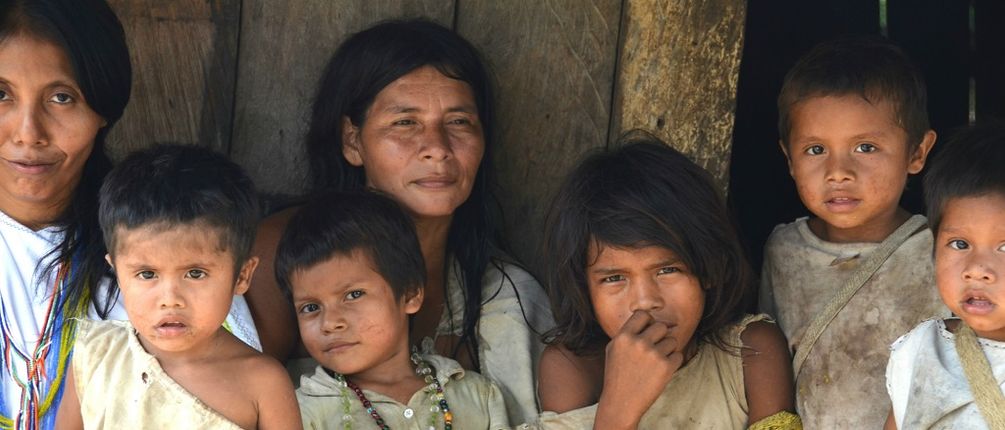
Better adapted to climate change
Malteser International has been engaged in securing the livelihood of the Afro-Colombian and indigenous population (above all, the Wayu people) in the Colombian departments of Magdalena and La Guajira since July 2015. Most members of the target population of around 4,000 have been displaced several times because of violent conflict. Many have lost their livelihood, and lack the access, material, finance and training in order to improve their situation. Climate change places an increasing pressure on the natural resources of the region, putting the income, nutrition and development opportunities of the population under threat. In an area strongly affected by progressive deforestation, the dependence and interdependence of the human population and their natural resources in the context of climate change need to be taken into account in order to protect their livelihood in the long term.
Because of its extreme poverty, and lack of access to basic services, the target region – a hilly and outlying rural area on the rivers Don Diego in the Department of Magdalena, and Tapia in the Department of La Guajira – is especially vulnerable. Most of the population consists of indigenous peoples, mainly Wayu, as well as Afro-Colombians, and impoverished smallholders known as Campesinos. All of these groups live from subsistence farming, and most of the target communities have been severely affected by armed conflict. Many of them have been displaced more than once, and lack the means to improve their situation. Diseases such as dengue, chikungunya and chagas are epidemic to the region. The areas which the displaced people are forced to settle often different from their places of origin, meaning that their traditional farming methods are no longer adequate or appropriate.
Colombia’s displaced person problem is still one of the largest in the world – a forgotten crisis which especially severe consequences in rural areas. The RUV (Registro único de víctimas) finds that displaced people from Afro-Colombian and indigenous groups are especially vulnerable and disadvantaged. Since the last wave of displacement in 2012, caused by violent guerilla and paramilitary conflict, and the further displacement caused by criminal groups in 2013 and 14, security and other conditions have stabilized thanks to a gradual peace process to the point where the conditions are suitable for development work. Such work is crucial in order to counter renewed displacement, conflict, violence or delinquency.
Undernutrition in the two target Departments affects up to 58.5% of the population. Acute malnutrition of children lies at a rate of between 6.8% in Magdalena, and 11.2% in La Guajira. Because of the marginalization of the target groups, there are no official statistics available for the target areas. Estimates place the level of malnutrition and limited access to basic services among the indigenous and Afro-Colombian population significantly higher than the already very poor official averages for the population as a whole.
Low agricultural productivity, limited crop diversity, as well as inappropriate and unsustainable farming techniques are all a problem in the target area. This is largely due to a lack of knowledge and equipment, as well as access to government help because of the marginalization of the groups concerned, as well as their settlement in particularly difficult to reach regions. The government itself is also lacking in knowledge of how to deal with the regions highly heterogeneous cultures and languages.
The region is also highly vulnerable from an ecological point of view – a matter of great importance, as its two rivers provide the population with their water. Deforestation, slash and burn, and excessive livestock farming, as well as erosion, landslides and the contamination of water resources are problems in the target area, which shows evidence of a tendency to reduced biodiversity and desertification. The lack of environmental awareness among the population, skills in the sustainable use of the community’s natural resources and inadequate opportunities for participation are all problems in the target area.
The creation of local capacity in the areas of WASH (Water, Sanitation and Hygiene), and food security, in the framework of an integrated and multi-sector approach to securing the livelihood and strengthening the resilience of vulnerable indigenous Afro-Colombian communities to climate change through:
- Support of sustainable agriculture and the protection of natural resources in order to protect livelihood and food security from climate change.
- Strengthening of hygienic framework conditions, as well as health, nutrition and hygiene knowledge for improved knowledge and exploitation of resources.
- Inclusive mapping of participating agricultural land as ‘Demo-Parcels’ for initial determination, and as basis for monitoring and follow up of the intervention
- Training for 100 smallholders as multipliers in sustainable agriculture, as well as crop and nutrition diversification
- Establishment and maintenance of 20 hectare demo garden to allow knowledge transfer and crop exchange
- Undertaking of 6 participatory workshops on the theme of climate change adaptation
- Handover of important agricultural equipment, as well as pilot measures in beekeeping as a contribution to the natural recovery of the ecosystem, and alternative income source
- Training and equipment of a 2nd community center for cases of forest fires, flooding and landslides.
- Training of 20 young people as multipliers
- Community mobilization in the areas of environment, health and hygiene
- Construction of a community wash house in Don Diego
- Undertaking of 9 focus groups with pregnant women and mothers on nutrition and hygiene in pregnancy, childhood and youth
Country info
Capital: Bogota
Area: 1,138 km²
Population: 47.9 Million
Project data
Project duration: since July 2015
Donors: German Federal Ministry for Economic Cooperation and Development (BMZ), private donations
Partners: Asociación de Biólogos de la Universidad del Atlántico (ABIUDEA), Programa de Desarrollo y Paz del César (PDPC)
Last updated: January 2016








